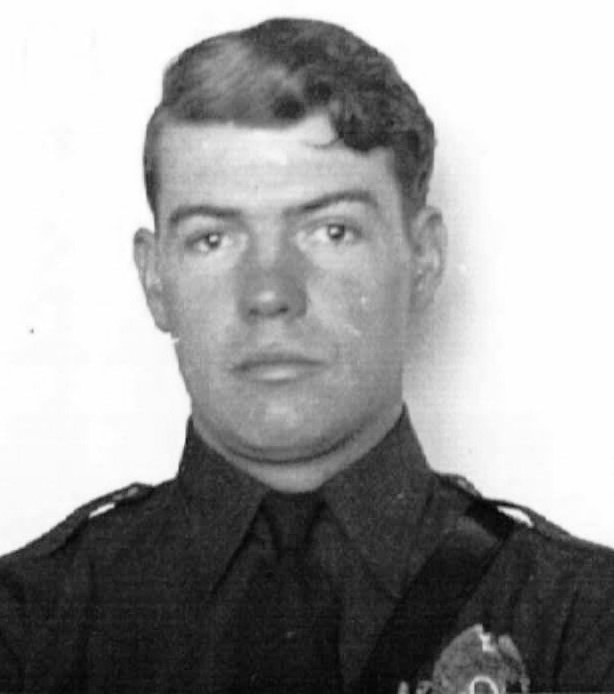

LIEUTENANT ROBERT J. KARROW
BADGE 24 & 166
SDPD 07/13/1935 - 06/11/1957
07/25/1910 - 11/02/2001
THE THIN BLUE LINE

Robert Karrow, 91 police academy was among many feats
If any of Robert J. Karrow's police colleagues doubted the power of hypnosis, a case of stolen underwear opened their minds.
In 1946, Mr. Karrow hypnotized a man who had been caught stealing women's undergarments from clotheslines.
"Under hypnosis, the man admitted the thefts and helped detectives cancel 91 cases," said Dave Crow, past president of the Retired Fire & Police Association
Mr. Karrow would go on to introduce the polygraph to the San Diego Police Department's arsenal in 1953, direct the department's first reserve unit and develop the department's first police operations manual.
As much as anything, though, he'll be remembered for his role as the founding director of what today is the San Diego Police Academy.
Mr. Karrow, who retired from police work as a lieutenant in 1957, died Friday at his home in the San Carlos area. He was 91.
He had been suffering from congestive heart failure and cancer, Crow said.
"The department owes a huge debt of gratitude to Lt. Karrow for pioneering the concept of law enforcement recruitment and in-service training that now exists nationwide," said Bob Crosby, a retired colleague.
A Navy veteran, Mr. Karrow joined the San Diego Police Department in July 1935. After working in patrol, he was assigned to an undercover operation targeting bookmakers.
He was chosen by then-Chief Cliff Peterson to head the new police training school in 1945. In that role, he conducted research on hypnosis in law enforcement and the use of the polygraph as a lie detector device.
As training director, he established a state-accredited police school and recruited a training committee that included the superintendent of the San Diego Community College District.
By 1947, the school had two full-time and 20 part-time instructors.
A student of psychology, Mr. Karrow was intrigued by hypnosis and the value of the polygraph. In the mid-1940s, he worked closely with a professor of experimental psychology at San Diego State College to master both.
In addition to using the polygraph in police investigations, he conducted polygraph interrogations for superior and municipal court judges. He later noted that the interrogations substantiated judges' opinions of the guilt or innocence of a defendant.
After retiring from police work, Mr. Karrow used a polygraph test in his role of director of security and training for Foodmaker Co. In an employee-screening process, he discovered that 60 percent of employees were stealing. "We cut that down to 1 percent," he told The San Diego Union-Tribune in 1996.
After retiring his polygraph, Mr. Karrow bought three Taco Bell franchises, one in Florida and two in Georgia. He later traded them for three San Diego franchises, which he sold in the mid-1980s.
Looking for a source of relaxation in retirement, Mr. Karrow learned how to play the organ. "He began attending classes, worked with a tutor and became an accomplished organ player," Crow said.
He also attended many retirement lunches and meetings and proved to be an invaluable resource on the history of the San Diego Police Department. "He had been providing historical materials to the Police Historical Society for display at the museum," Crow said.
"He was one of the true giants of his profession, both as an active member and after retirement. He started us on the road to the professional standing and respect that we enjoy today."
Mr. Karrow, a native of Des Moines, Iowa, settled in San Diego after serving in the Navy.
He is survived by a son, Robert Jr. of La Jolla; and a granddaughter.
Cremation was planned.
Basic information is provided as a courtesy and is obtained from a variety of sources including public data, museum files and or other mediums. While the San Diego Police Historical Association strives for accuracy, there can be issues beyond our control which renders us unable to attest to the veracity of what is presented. More specific information may be available if research is conducted. Research is done at a cost of $50 per hour with no assurances of the outcome. For additional info please contact us.